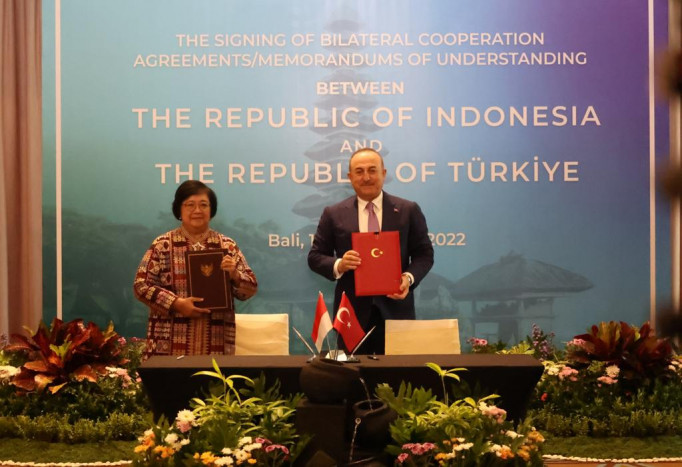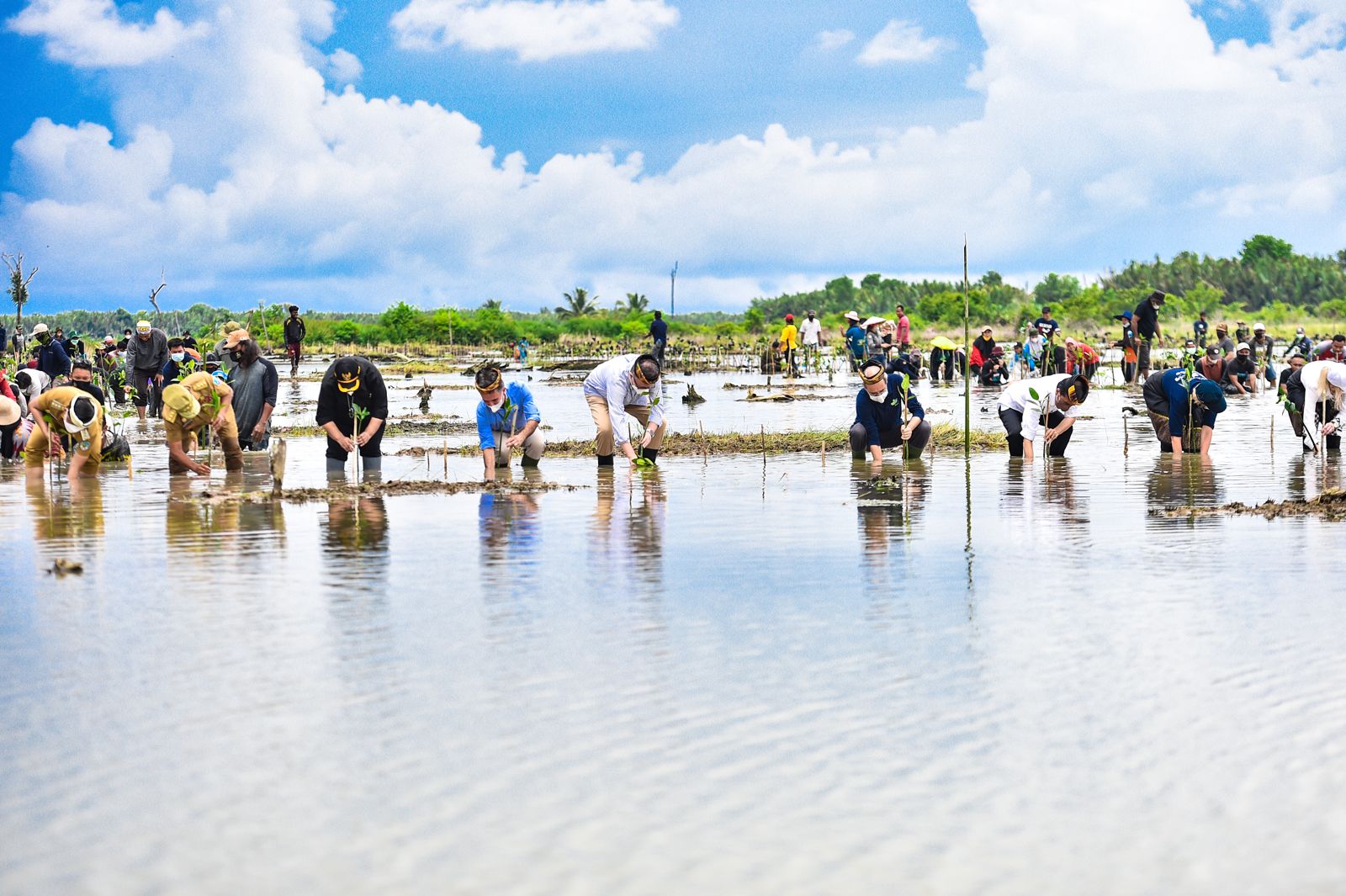Accelerating Concrete Measures and Collaboration to Tackle Environment and Climate Problems

ALL nations are at risk of being adversely affected by climate change. No government can tackle this alone. Therefore, the global community is responsible for solving this problem together, said Minister of Environment and Forestry Siti Nurbaya Bakar to climate and environment ministers of G-20 member states in Bali on August 30.
Nurbaya emphasized that multilateral forums such as G7, G20, and UNFCCC require continuous support. “These forums are the only effective way to synchronize our efforts and commitment based on the international community’s shared responsibility to address global challenges,” she said.
Indonesia firmly stands behind this shared responsibility as the country holds the G20 presidency in 2022. The G-20 forum—comprising 19 countries and the European Union—represents the world’s biggest economies, putting it in a strategic position to urge more commitments from other countries to climate change mitigation causes. Indonesia also believes these commitments must be translated into policies and concrete measures.

Nurbaya said that the G-20 members discussed environmental and climate issues in its Environment Deputies Meeting and Climate Sustainability Working Group (EDM-CSWG), which highlighted three priority issues.
Baca juga: G20 Summit, Proud Culmination of Indonesian G20 Presidency
First, to support sustainable economic recovery to promote sustainable and environmentally-friendly economic development by utilizing the additional benefits of post-COVID-19 recovery programs and achieving sustainable development goals.
Second, to increase land and ocean-based actions to support environmental protection and climate change control objectives with emphasis on the importance of the contributions made by unique ecosystems to climate change mitigation and adaptation, as well as the blue economy.
Third, increased mobilization of resources to support the protection of the environment and other goals of climate change mitigation, coupled with improved implementation of innovative financing mechanisms, while mobilizing financing for environmental projects with an emphasis on the crucial role of the private sector.
Strengthening Climate Actions
While holding the G-20 Presidency, Indonesia continues to push for the acceleration of inclusive and equitable energy transition, cooperation in overcoming land degradation, marine and forest conservation, and stronger cooperation to support green recovery as a reflection of Indonesia’s G-20 presidency’s theme, “Recover Together, Recover Stronger.”

Over the last seven to eight years, the Indonesian government has transformed environmental and forestry development. First, it has significantly cut the rate of deforestation and forest and land degradation to the lowest it has ever been in history. Second, the country has developed permanent prevention measures against land and forest fires, offering solutions to overcome the negative socio-economic impact on the environment and the community.
Third, the country had put the principles of ecological carrying capacity and environmental capacity in general in forest area utilization in practice, incorporating the directions in the revised National Forestry Plan (RTKN), which provides macro spatial guidelines for forestry development for the 2011-2030 period.
Fourth, the country has prevented biodiversity loss through land conservation and protection.
Fifth, the Ministry of Environment and Forestry had aligned its future policies with the country’s sustainable development goals (SDGs), the Paris Agreement, and other international agreements on land degradation mitigation and other international conventions.
Sixth, the country has developed climate resilience through mangrove restoration, management, recovery, forest rehabilitation, and deforestation control.
Seventh, Indonesia had decided to redirect its forest management from timber production to a community- and resource-based approach.
Eighth, Law No. 11 of 2020 on Job Creation further stresses the need for policies to balance economic and environmental aspects. Economic growth for economic recovery is still necessary since it comes with the requisite transformations, creating new job opportunities.
Ninth, forestry legislation and subsequent regulations have been designed to enable corporations to develop a diversified forestry industry.
Tenth, environmental services are incorporated as part of climate change mitigation on land-based forest management. And lastly, the Law on Job Creation and the technical regulations derived from it will reaffirm the government’s position on forestry concession and utilization, which is to be on the same side as the community.
Reducing greenhouse gases emission
Siti Nurbaya said that Indonesia has become increasingly ambitious in cutting its greenhouse gases emission to mitigate climate change. Initially, the country’s Nationally Determined Contribution (NDC) had put Indonesia’s goal for greenhouse gas emission reduction at 29% with available domestic resources and 41% with international support.
However, the Enhanced NDC (ENDC) recently submitted by the government to the UNFCCC Secretariat had raised Indonesia’s goal for greenhouse gas emission reduction to 31.89% with available domestic resources and 43.20% with international support.
The target had been raised in response to the national policies on climate change, including Indonesia’s FoLU (Forestry and Land Use) Net-sink 2030 campaign for the expansion of electric vehicle use, intensified action on waste management (for instance, through the use
Terkini Lainnya
IWAPI dan KLHK Menyerahkan Bantuan Motor Sampah untuk Pengelolaan Sampah dan Penghijauan
KLHK Tetapkan Bos Tambang Pasir Ilegal di TN Halimun Salak sebagai Tersangka
Indonesia Diapresiasi karena Gunakan Teknologi untuk Pantau Hutan Dan Karhutla
KLHK dan Norwegia Perkuat Kerja Sama Pengelolaan Hutan Lestari
2 Ton Alat Kesehatan Bermerkuri Ditarik dari Faskes di Bali
KLHK Tingkatkan Kapasitas Manggala Agni untuk Tangani Karhutla
Menteri LHK Siti Nurbaya Teken Kerja Sama Dengan Bezos Earth Fund
Pemerintah Kembangkan Program Agar Masyarakat Bisa Akses Dana BPDLH
Menteri LHK: Pengukuran Deforestasi di RI Perlu Metode yang Lebih Akurat
Menteri LHK Tolak Disebut Bagi-bagi 'Kue' Izin Usaha Tambang ke Ormas
Festival Pengendalian Lingkungan 2024, Atasi Pencemaran dan Pulihkan Lingkungan
Spirit Dedikatif Petugas Haji
Arti Penting Kunjungan Grand Syaikh Al-Azhar
Abnon Jaksel: Memperkenalkan Jakarta Selatan melalui Pariwisata dan Kebudayaan Betawi
Pancasila, Perempuan, dan Planet
Eskalasi Harga Pangan Tengah Tahun
Iuran Tapera ibarat Masyarakat Berdiri di Air Sebatas Dagu
Polresta Malang Kota dan Kick Andy Foundation Serahkan 37 Kaki Palsu
Turnamen Golf Daikin Jadi Ajang Himpun Dukungan Pencegahan Anak Stunting
Kolaborasi RS Siloam, Telkomsel, dan BenihBaik Gelar Medical Check Up Gratis untuk Veteran
Ulang Tahun, D'Cost Donasi ke 17 Panti Asuhan Melalui BenihBaik.com
Informasi
Rubrikasi
Opini
Ekonomi
Humaniora
Olahraga
Weekend
Video
Sitemap